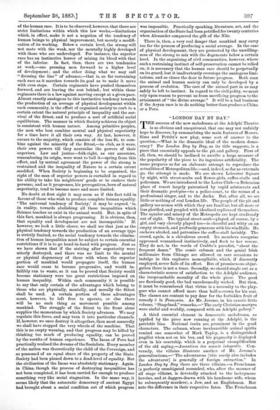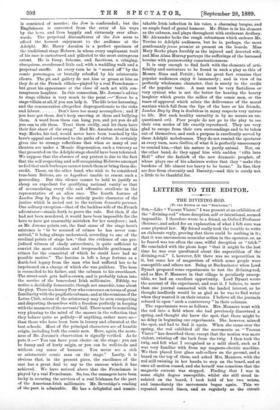" LONDON DAY BY DAY."
THE success of the new melodrama at the Adelphi Theatre is so obvious and unequivocal, that one may not unfairly • hope to discover, by summarising the main features of Messrs. Sims and Pettitt's new play, some sort of answer to the question,—What is the dramatic ideal of the modern demo- cracy? For London Day by Day, as its title suggests, is a piece that essentially appeals to the pit and gallery. First of all, then, we should be inclined to ascribe a large measure of the popularity of the piece to its ingenious artificiality. The name prepares us for an elaborate attempt to reproduce the actualities of Metropolitan life.—and, indeed, so far as externals go, the attempt is made. We are shown Leicester Square by night, with street-arabs and flower-girls, coffee-stalls and policemen. We are introduced to the Lotus Club—a Bohemian place of resort largely patronised by vapid aristocrats and their dramatic protegies—to a police-court, to the rooms of a professional singer, and to the docks. But, after all, we see little or nothing of real London life. The people of the pit and gallery see scenes with which they are familiar, but all more or less glorified, and peopled with idealised replicas of themselves. The squalor and misery of the Metropolis are kept studiously out of sight. The typical street-arab—played, of course, by a girl, and very cleverly played too—is cheerful and witty on an empty stomach, and profusely generous with his windfalls. He eschews alcohol, and patronises the coffee-stall lavishly. The crowd, again, is a chivalrous crowd. Its members recognise oppressed womanhood instinctively, and flock to her rescue. They do not, in the words of Crabbe's parodist, "shout the frequent damn." The comic cabman and the genial Irish millionaire from Chicago are allowed on rare occasions to indulge in this explosive monosyllable, which, if discreetly employed, never fails of its effect. But of promiscuous objur- gation there is not a trace. Secondly, we should single out as a characteristic source of satisfaction to the Adelphi audience, the irreproachable morality of the whole piece. The good. are flawlessly good, the bad unredeemedly wicked. But then, it must be remembered that virtue is a necessity to the play- goer who cannot afford more than half-a-crown for his seat. The classes are content to pay dear for the forbidden fruit of comedy a la .Francaise. As Mr. Jerome, in his caustic little volume, " Stageland," remarks,—" The early Christian martyrs were sinful and worldly, compared with an Adelphi gallery."
A third essential element in democratic melodrama, as typified by the piece now running at the Adelphi, is the patriotic bias. National traits are, prominent in the good characters. The cabman, whose inexhaustible animal spirits remind one somewhat of Mark Tapley, is a distinguished pugilist when not on his box, and his pugnacity is displayed even in his courtship, which is a perpetual exemplification of the old saying,—Antantium ira anions integratio. Con- versely, the villains illustrate another of Mr. Jerome's generalisations,—" The adventuress [this surely also includes
the adventurer] is generally of foreign extraction." In London Day by Day there are three villains,—a Frenchman (a perfectly unmitigated scoundrel, who, after the manner of all stage villains, is devotedly attached to the lachrymose heroine, and at daggers-drawn with his handsome wife, whom he subsequently murders), a Jew, and an Englishman. But note the difference in their respective fates. The Frenchman is convicted of murder; the Jew is confounded ; but the Englishman is converted from the error of his ways by the hero, and lives happily and virtuously ever after- wards. The perpetual discomfitnres of the Jew seem to afford the keenest enjoyment to the audience at the Adelphi. Mr. Harry Ascalon is a perfect specimen of the traditional stage Hebrew, in whom every unpleasant trait of his race is caricatured and pilloried to the most outrageous extent. He is fussy, fulsome, and facetious, a cringing, obsequious, overdressed little cad, with a waddling walk and a perpetual snuffle. At every turn he is " scored off" by the comic personages, or brutally rebuffed by his aristocratic clients. The pit and gallery do not hiss or groan at him as they do at the French villain—played by a real Frenchman— but greet his appearance at the close of each act with con- temptuous laughter. In this connection, Mr. Jerome's advice to stage villains is very much to the point :—" Never be a stage villain at all, if you can help it. The life is too harassing, and the remuneration altogether disproportionate to the risks and labour Don't have too many accomplices ; and if you have got them, don't keep sneering at them and bullying them. A word from them can hang you, and yet you do all you can to rile them. Treat them civilly, and let them have their fair share of the swag." Had Mr. Ascalon acted in this way, Marks, his tool, would never have been touched by the hero's appeal and returned to the paths of virtue. It certainly gives rise to strange reflections that when so many of our theatres are under a Mosaic dispensation, such a travesty as that presented on the Adelphi stage should have been tolerated. We suppose that the absence of any protest is due to the fact that the self-respecting and self-recognising Hebrews amongst us feel that such burlesque cannot touch them or bring them dis- credit. Those, on the other hand, who wish to be considered true-born Britons, are ex hypothesi unable to resent such a proceeding. But this silence cannot be held to justify so cheap an expedient for gratifying national vanity as that of accumulating every vile and offensive attribute in the representative of an alien race. The fourth feature of London Day by Day is the entirely poetic character of the justice which is meted out to the various dramatis persona. One solitary exception—that of the luckless wife of the French adventurer—stands forth to prove the rule. But then, if she had not been murdered, it would have been impossible for the hero to have got reasonably mistaken for her murderer ; and, as Mr. Jerome points out, the final cause of the stage hero's existence is "to be accused of crimes he has never com- mitted," it being always understood, according to one of the cardinal points of stage law, "that the evidence of one pre- judiced witness of shady antecedents, is quite sufficient to convict the most stainless and irreproachable gentleman of crimes for the committal of which he could have had no possible motive." The heroine is left a large fortune as a death-bed legacy from the man who had suffered her to be imprisoned on a charge of which she was guiltless. The hero is reconciled to his father, and the cabman to his sweetheart. The street-arab gets half-a-crown, and is probably taken into the service of the benevolent Irish millionaire. Fifthly, we notice a decidedly democratic, though not anarchic, tone about the play. Th ere is a horsey Peer who converses on terms of great familiarity with the pugilistic cabman; and at the reunions of the Lotus Club, scions of the aristocracy may be seen comporting and disporting themselves with a freedom perfectly in keeping with the manners of the servants' hall. There must be something very pleasing to the mind of the masses in the reflection that they behave quite as politely—if anything, rather more so— than those who htive been born in luxury and educated at the best schools. Most of the principal characters are of humble origin, including both the comic men. Here, again, the acute- ness of Mr. Jerome's observation is signally verified. As he puts it :—" You can have your choice on the stage : you can be funny and of lowly origin, or you can be well-to-do and without any sense of humour. You never see a rich or aristocratic comic man on the stage." Lastly, it is obvious that, in the present piece, the excellence of the cast has a great deal to say to the success which it has achieved. We have noticed above that the Frenchman is played by a real Frenchman. So, too, the managers have been lucky in securing the services of a real Irishman for the part of the American-Irish millionaire. Mr. Beveridge's reading of the part is admirable. He has a delightful and unmis- takable Irish inflection in his voice, a charming brogue, and an ample fund of genial humour. Mr. Shine is in his element as the cabman, and plays throughout with exuberant drollery. Mr. Alexander lacks the rough robustness which endears Mr. Terriss to Adelphi audiences, but he is, perhaps, the most gentlemanly jeune premier at present on the boards. Miss Mary Rorke plays forcibly as the injured and deserted wife, and Miss Alma Murray portrays the sufferings of the harassed heroine with praiseworthy conscientiousness.
It is easy enough to find fault with the elements of arti- ficiality and caricature to be found in such a play as this of Messrs. Sims and Pettitt ; but the great fact remains that popular audiences enjoy it immensely ; and in view of its perfectly wholesome character, that is surely to the credit of the popular taste. A man must be very fastidious or very cynical who is not the better for hearing the hearty laughter which greets the sallies of the comic men, or the roars of approval which salute the deliverance of the moral maxims which fall from the lips of the hero or his friends. London Day by Day is doubtless in many respects very untrue to life. But such healthy unreality is by no means an un- questioned evil. Poor people do not go to the play to see their own modes of life exactly reproduced. They are very glad to escape from their own surroundings and to be taken out of themselves, and such a purpose is excellently served by these Adelphi melodramas. They do not remind the spectator at every turn, more Gallico, of what it is perfectly unnecessary to remind him,—that his nature is partly animal. Nor, on the other hand, do they appal him with sudden " rifts into Hell" after the fashiofl of the new dramatic prophet, of whose plays one of his admirers writes that they " make the burdens of life almost too heavy to be borne." In fine, they are free from obscenity and Ibsenity,—and this is surely not a little to be thankful for.







































 Previous page
Previous page